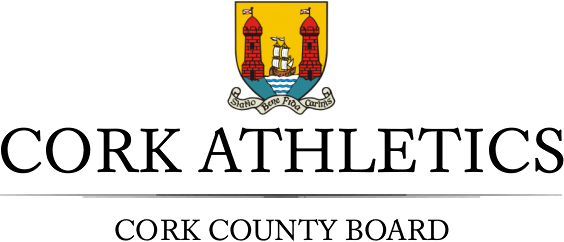Irish Runner Magazine - Marcus O'Sullivan - July 1986
Marcus O'Sullivan - Cork's Crown Prince
Irish Runner Magazine, July 1986 - Vol 6, No 5, P8-11
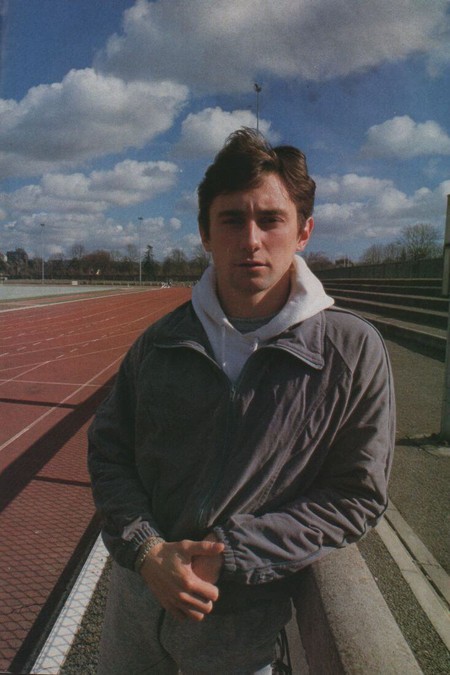
Marcus O'Sulluvan at the Mardyke, Cork
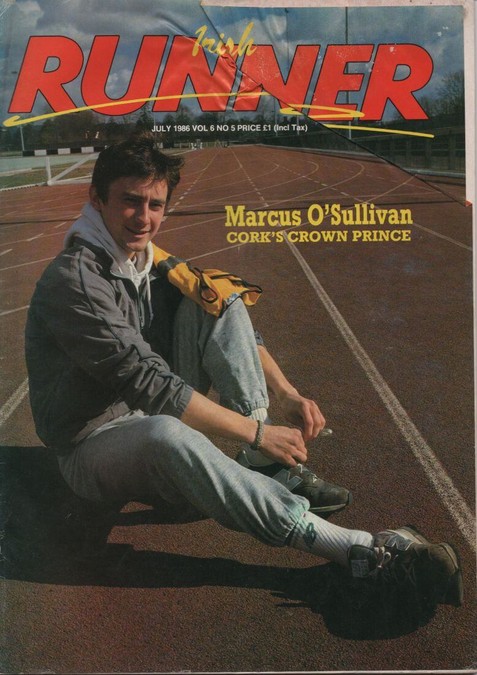
Marcus O'Sullivan featured on Cover of Irish Runner Magazine, July 1986
Download Full Article (PDF File) - Irish Runner Magazine, July 1986 - Vol 6, No 5, P8-11
It was on the nightly bus ride home to Cork City, from the boat yards of Kinsale, where he was learning the fisherman's trade, that young Marcus O’Sullivan first came to terms with his true athletic potential.
During those long bus rides, the then young school-leaver began to think seriously about his future, and what he might do to change his life before it was too late. He remembered the words of advice from Donie Walsh, the highly
acclaimed Cork runner, who had earned a scholarship to Villanova University, from North Monastery C.B.S.
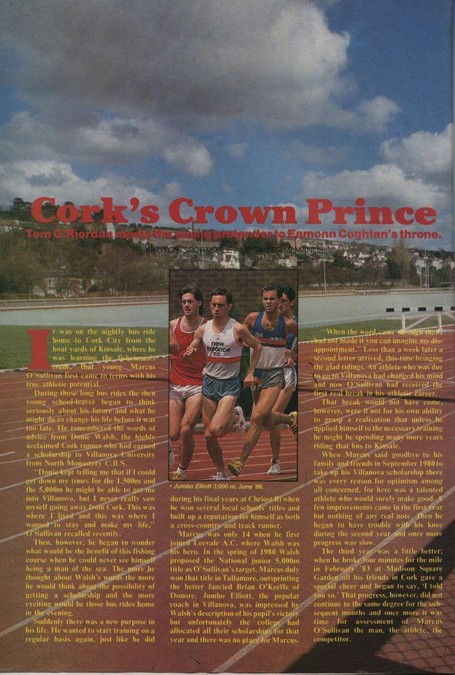
Page 8, Irish Runner Magazine, July 1986
“Donie kept telling me that, if I could get down my times for the 1,500m and, the 5,000m, he might be able to get me into Vilianova, but I never really saw myself going away from Cork. This was where I lived, and this was where I wanted to stay and make my life,” O'Sullivan recalled recently.
Then, however, he began to wonder what would be the benefit of this fishing course, when he could never see himself being a man of the sea. The more he thought about Walsh’s words, the more he would think about the possibility of getting a scholarship, and the more exciting would be those bus rides home in the evening.
Suddenly there was a new purpose in his life, he wanted to start training on a regular basis again, just like he did
during his final years at Chríost Rí, when he won several local schools' titles, and built up a reputation for himself as both a cross-country and track runner.
Marcus was only 14 when he first joined Leevale A.C., where Walsh was his hero. In the spring of 1980, Walsh proposed the National Junior 5,000m title as O'Sullivan's target. Marcus duly won that title in Tullamore, outsprinting the better fancied Brian O'Keeffe of Donore. Jumbo Elliott, the popular coach in Villanova, was impressed by Walsh's description of his pupil’s victory, but unfortunately the college had allocated all their scholarships for that year, and there was no place for Marcus.
"When the word came through that I had not made it you can imagine my disappointment.” Less than a week later a second letter arrived, this time bringing the glad tidings. An athlete who was due to go to Villanova had changed his mind, and now O'Sullivan had received the first real break in his athletic career.
That break would not have come, however, were it not for his own ability to grasp a realisation that, unless he applied himself to the necessary training, he might be spending many more years riding that bus to Kinsale.
When Marcus said goodbye to his family and friends in September 1980, to take up his Villanova scholarship, there was every reason for optimism among all concerned, for here was a talented athlete, who would surely make good. A few improvements came in the first year, but nothing of any real note. Then he began to have trouble with his knee during the second year, and, once more, progress was slow.
The third year was a little better; when he broke four minutes for the mile, in February '83, at Madison Square Gardens, all his friends in Cork gave a special cheer, and began to say, 'I told you so.' That progress, however, did not continue to the same degree for the subsequent months, and, once more, it was time for assessment of Marcus O'Sullivan the man, the athlete, the competitor.
Once more it was time for honesty, and, once more, he faced the facts squarely. “I made a number of foolish mistakes.” he says with refreshing candour. “I threw away those first three years of my scholarship at Villanova. I lost sight of what I should be doing, and what I really set out to do when I first left Cork.
“I did a certain amount of training and study, but never reached the maximum of my capabilities. During that time I never got the results which other athletes, of less potential, manage to achieve. Perhaps it went back to those days in Cork when I made up my mind to try and get to Villanova, but, once I had achieved that, failed to give of myself to improve still further.”
RETROSPECT
In retrospect, the death of Jumbo Elliott, just a year after Marcus arrived in Villanova, was a possible reason for his failure to maintain any kind of significant progress.
As the 1983 outdoor track season was about to commence, he began to look critically at himself. Leaving the injury problems aside, he was not very happy with what he saw. He recalled riding the bus to and from Kinsale — if he was to continue in this way, his athletic life would soon pass by, and very few would notice.
He began to pick up the pieces with a new urgency, started to get out for an early morning run, something he had only very occasionally done in the past; he was one of the first down to the track in the evenings for training.
It was a bit late to start thinking about making the Irish team for the ’83 World Championships in Helsinki, but during that summer he broke four minutes outdoors for the mile for the first time, with 3:56.65. “When I ran that time I realised, more than ever, what was possible. I had only trained properly for a month or two, and, there and then, promised myself that I would try and make up for the three wasted years, during my final term at Villanova.”
Walsh still helped to guide O’Sullivan’s training, from Cork, and, sure enough, the summer of ’84 had no sooner warmed up on the track, than we saw the Corkman chase home the great Joaquim Cruz, of Brazil, to finish second in the U.S. Collegiate 1,500m final. His time: a superb new career-best of 3:37.4. He had qualified for the Los Angeles Olympics.
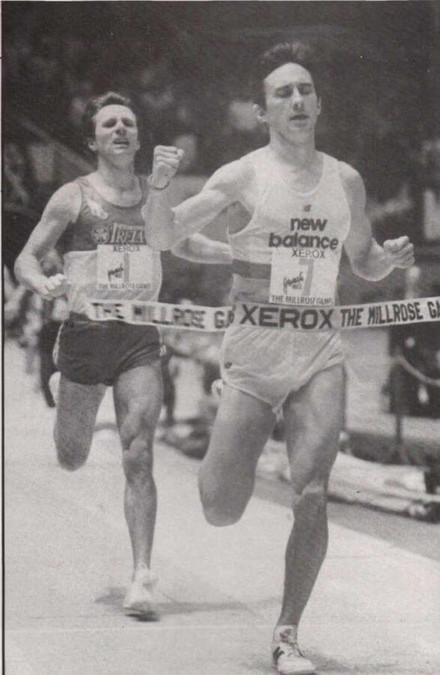
Marcus O'Sullivan wins Wanamaker Mile at Millrose Games, ahead of Eamonn Coughlan
"I have always looked on Marcus O’Sullivan as the most exciting middle-distance runner on the Irish scene for some years. He showed flashes of that excitement on occasions and, to be truthful, I expected him to start making his mark before he did.
Obviously he needed time to mature, and gain the necessary experience, and it’s only now that we are beginning to see the real O’Sullivan.
He has yet to win what would be termed a major title, but he came up against Joaquim Cruz of Brazil in his only American Collegiate final, and so his second place was probably worth more, in a year that the winner went on to win the Olympic 800m gold medal.
However, during the next couple of years, I would see O’Sullivan setting Irish records for every distance, from 800m, right up to 10,000 metres. He already holds the 800m, and I’m looking forward to seeing him really make his mark at 1,500m and mile this season, culminating with a good performance in the European Championships. Most definitely an exciting athlete for the future." - Eamonn Coghlan
He returned to compete in the Cork City Sports, at the Mardyke, and ran another lifetime best for the mile: 3:55.82. This was more like the real O’Sullivan. He then outsprinted Frank O’Mara with a 53-second last lap to win his first National senior 1,500m title, in 1984.
“From being a stagnant athlete, I was showing improvement, and I really went to the Los Angeles Olympics in a happy frame of mind. I went there to experience everything, the atmosphere, the competition, the friendships.” The competition he obviously relished, for, on two successive days, he ran best times for the 800m, setting an Irish record of 1:46.21 in the second round. Then, his never-say-die attitude in the first round of the 1,500m was rewarded by qualification for the semi-finals.
RELUCTANT
After the Olympics, he returned home to Ireland, and settled back in Cork. He trained regularly and ran a few road races and even finished second over a muddy 7½ miles of the inter-counties cross-country, which proved he had stamina also. All the time, however, he longed to return to Villanova, and did so early in ’85, once he had secured a place in graduate school.
There followed a few reasonably good indoor runs, but, while he was picked for the European Indoors a month in advance, he travelled to Athens reluctantly, and, only out of loyalty to Irish officials. However, he returned with a silver medal from the 1,500m and he was no sooner back in Villanova, than part of another problem was solved.
That was the matter of having a regular coach. “Donie was always ready to give me training schedules, and ring me up on the ’phone, but what I needed was someone with whom I could talk and discuss things.” Tom Donnelly, himself a former Villanova distance runner, was that man; he was already coach to Sydney Maree.
“Tom’s help has made a major difference to me,” Marcus admits openly. “He is there for all the interval sessions, and the whole aspect of athlete-coach relationship is really good between Tom and myself.” The emphasis on repeat hill-training has made a difference also. “I started on those hills early last year, and went back to them again in November, and I really feel the benefit of them.”
I really believe we saw the benefit of that work last summer, when O’Sullivan pushed Maree — a former world 1,500m record-holder — all the way to the line in Cork, ending up with a mile time of 3:52.64, more than three seconds faster than he had run the previous year.
From there, he went on to win the British AAA 1,500m title, run another lifetime best of 3:37.20, in Oslo, and smash his own National 800m record with a highly respectable 1:45.87 in Berlin.
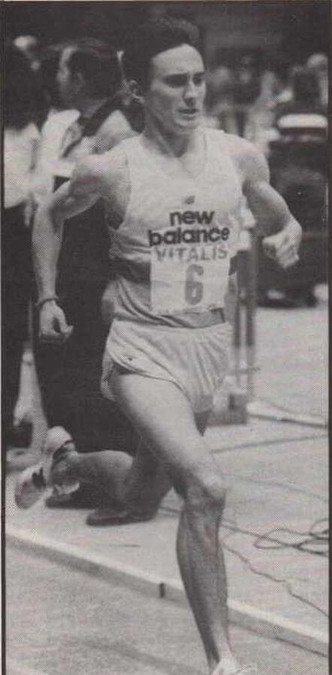 Marcus O'Sullivan
Marcus O'Sullivan
During September and October of last year, his training became more intense, the repeat hills were attacked with greater purpose. By last February, the whole of Cork was ready to embrace its young star, who had finally hit the headlines with a series of nine wins on the trot.
He did not suffer from any illusions regarding his fine form. “People will be saying that I can beat Cram, Coe and Aouita, but these fellows are still up there. I like to be realistic, and I feel that some of those I beat indoors did not run up to their potential.”
During the months of January and February, he practically stepped into Eamonn Coghlan’s shoes, repeatedly defeating the world record-holder. “What these races did for me,” he says with enthusiasm, “is that they have got a few barriers out of the way, and also given me great confidence.”
The Millrose Games win in an indoor lifetime best 3:56.03 gave him his greatest thrill. “I felt the pressure building up,” he admitted, “and Coghlan was going to be hard to beat, since he was going for a record seventh success. But I wanted it also. I knew he was ready, and I waited before making my move, and then just held him off.”
O’Sullivan admits he made money during the indoor campaign, but nothing like some people might be led to believe. “This talk about 10,000 dollars for some races is crazy; that is only for the super-stars, and I’m still a long way from that. I’ve found it expensive to live in the USA, and, apart from renting an apartment, and buying food, there are numerous other expenses.”
On the question of money and priorities, I believe that O’Sullivan has a solid attitude on both. “I would never want to bank on making a living out of athletics,” he said. “That is the reason why I’m working towards my MBA (Masters in Business Administration), and I would hope and pray that questions of economy and money would never influence me or dictate to me what races I would run.
“At the end of your career, you are judged as an athlete on what you have achieved when the chips are down, like in the Europeans, World Championships or Olympics, not on how much money you have in the bank.”
After the successes of the indoors, it took the Corkman a couple of weeks to get back into the disciplines of hard training again. “It picked up after a while, and I was back on 90 miles a week on a regular basis. The European Championships were always in the back of my mind and they have been my target for several weeks now.”
PROMISING
The season has already begun promisingly, with career best times of 13:29.2, in the 5,000m, and 7:58.17 for the 3,000m. Now we will have the pleasure of seeing this gifted 24 year old making his debut this side of the Atlantic, in the Dale Farm Ulster Games, and then in his beloved Cork, for the “City Sports”.
“I have to admit I love running in Cork, although there are the additional pressures; people always expect you to win, but then, if you manage to do that they, will be talking about the Europeans and the gold medal. I suppose it’s better than having them asking what ever happened to that fellow called O’Sullivan that went to Villanova...?”
Well, here he is in living colour.
Related Articles
Marcus O'Sullivan's Off-The-Ball Interview on 20th Anniversary of 100th Sub-4 Mile
Irish Runner Magazine Archives
